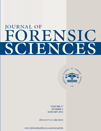Differential Decomposition Patterns in Charred Versus Un-Charred Remains
Abstract
Abstract: Although researchers have examined many aspects of fire modification, the rate and pattern of decomposition in charred remains have not been studied previously. This study utilized 48 domestic pigs, divided into 24 charred (head, neck, and limbs burned to Crow–Glassman level 1 and torso to level 2) and 24 un-charred pig carcasses. Decomposition of control carcasses was scored at 50 accumulated degree days (ADD) intervals, and charred carcasses were also observed and photographed at this time. A Charred Body Scale was subsequently created, and charred carcasses were scored retrospectively for the same ADD intervals. Analysis using a mixed-effect repeated measures model indicated that, while decomposition rate was not statistically different between the two groups (p = 0.2692), the charred remains initially displayed an ostensibly more advanced pattern. Body regions displaying significant charring decomposed at a faster rate (p < 0.001), while areas with very light levels of charring decomposed at a significantly slower rate (p < 0.001).




